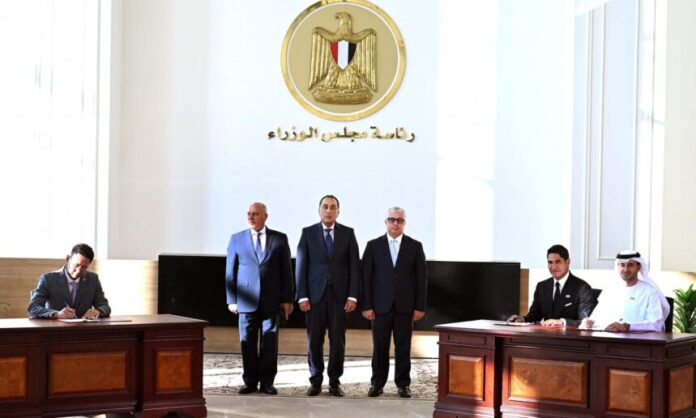Egypt has taken a major step forward in its renewable energy drive with the signing of a land usufruct contract for a $220 million industrial complex dedicated to solar technology.
The agreement was witnessed on Wednesday by Prime Minister Mostafa Madbouly in the Suez Canal Economic Zone (SCZONE).
The “Atom Solar Egypt” project, a joint venture between Egyptian, Emirati, Bahraini, and Chinese investors, will focus on producing solar cells, panels, and energy storage systems.
Spanning 200,000 square metres in the Sokhna industrial zone, the integrated complex aims to position Egypt as a regional hub for solar manufacturing.
According to a statement from the Prime Minister’s office, the facility will include a 2-gigawatt (GW) solar cell factory, a 2 GW solar panel factory, and a 1 gigawatt-hour (GWh) energy storage systems plant.
The three-year project is expected to generate 841 direct jobs, significantly boosting the local workforce in advanced renewable energy industries.
The investor group includes TEDA-Egypt, Global South Utilities (GSU) of the UAE, AH Industrial Management of Egypt, and Atom Solar Egypt’s founder, Ahmed Abou Hashima.
China’s JA Solar, one of the world’s largest solar manufacturers, will serve as the technical investor, while Infinity Capital from Bahrain joins the partnership.
Prime Minister Madbouly praised the project as a milestone for Egypt’s industrial and energy future. “The SCZONE represents an integrated platform for global investment and a regional hub for the green economy,” he said, highlighting the government’s commitment to supporting renewable energy and advanced industries.
Walid Gamal El-Din, chairman of the SCZONE, echoed these remarks, describing the project as a “qualitative leap” in Egypt’s efforts to localise the solar energy industry.
He noted that the venture reflects the success of the zone’s strategy to attract quality investment and establish international partnerships that align with green economy objectives.
One of the project’s distinguishing features is its dual-market strategy. The entire output of the solar cell factory will be allocated for export to global markets, reflecting Egypt’s ambitions to become a significant player in international renewable energy supply chains.
Meanwhile, the solar panel production will cater to domestic demand and regional markets across the Middle East and Africa. In addition, the project aims to gradually increase the share of local content in its products.
By incorporating Egyptian-sourced materials such as aluminium and glass, it will not only strengthen supply chains but also create added value within Egypt’s economy.
Founded in 2005, JA Solar has operations in over 165 countries and is known for its high-efficiency solar technology. Its involvement brings global expertise and credibility to the initiative.
As Egypt seeks to diversify its energy mix and strengthen its green economy, projects like Atom Solar Egypt underline the country’s determination to align with international sustainability targets.
With strong backing from global investors and a clear export-oriented strategy, the new complex is poised to reshape the renewable energy landscape in Egypt and the wider region.

